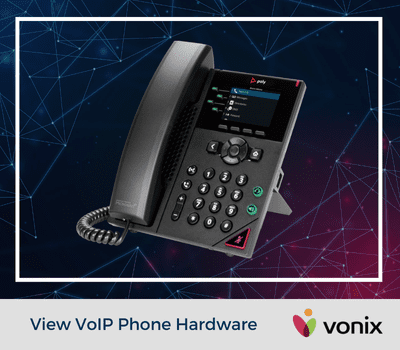Welcome to Vonix's Complete Guide to Cloud Phone Systems
Phone systems have come a long way from the days of shared landlines. Today, businesses require more than just a basic dial tone—they need a communication solution that delivers crystal-clear calls, unmatched reliability, and a smooth, hassle-free experience. In a world where customers expect fast, efficient connections, the ability to reach the right person quickly can make or break a sale. To meet these rising expectations, your business phone service must be ready to perform at its best. That’s where cloud phone systems come in, offering the flexibility and features your business needs to stay ahead.
So, what should you expect from your phone service provider? High-quality calls, top-notch customer support, and a suite of advanced features that streamline communication. It’s time to move beyond outdated landlines and embrace cloud-based phone systems, also known as Business VoIP. With the right technology, your customer interactions will be more efficient, effective, and impactful.
Phones have come a long way from the shared lines of generations past. Today, callers expect clear communications on a simple calling platform. And for customers, the ease of reaching the right person can be a deciding factor when they buy. A business’ phone service needs to keep up with customer expectations.
So what should you expect from your phone company? High quality calls, superior support, and better features. Your customer calls should be simple and efficient. It’s time for you to cut the landline and switch to a cloud-based phone services, also known as Business VoIP.


The Ultimate Guide to VoIP, Cloud Phone Systems, and PBX: What You Need to Know
In this post, we’ll explore the key benefits of VoIP calling and help you understand why it’s the ideal solution for modern businesses. This Guide to Cloud Phone Systems will walk you through the differences between VoIP, cloud phone systems, and PBX, so you’ll know exactly what to look for when shopping for a new phone provider.
By the end of this guide, you’ll have a clear understanding of:
- How VoIP improves call quality and reduces costs
- The advantages of cloud-based phone systems for flexibility and mobility
- The role of PBX in business communications and how it integrates with VoIP
- Key features to prioritize when selecting a phone system for your business
With this guide, you’ll be fully equipped to choose the right phone solution for your company’s needs.
Quickly jump to a topic using these links
What is VoIP? VoIP Phones Explained by Vonix
VoIP (Voice Over Internet Protocol) is revolutionizing the way businesses communicate. By using your internet connection instead of traditional phone lines, VoIP makes it easier, more affordable, and more flexible to manage your business calls. At Vonix, we help businesses make the switch to VoIP with seamless solutions that improve communication, reduce costs, and enhance productivity.
Just like the switch from television antennas to streaming television resulted in better quality picture and features, switching to VoIP gives businesses access to several perks.

Here are 5 benefits of a VoIP Business Phone System:
Lower Costs
The cost for VoIP business phones can be much cheaper than traditional phone lines. You often can use one physical phone to accept calls from an unlimited number of phone lines for one low cost. Plus, since you’ll no longer be charged by minutes of use, you’ll have access to unlimited calls. Whether you’re calling your neighbor or a client on the other side of the country, your cost remains the same.
VoIP phones are internet-connected, resulting in fewer hardware costs, too. Your hardware is always updated to the newest software versions without having to trade in your phones as often. Some phone providers also provide complete system maintenance. That means that you won’t have to call an IT person when you want to make a change to your phone system. With more reliable hardware and maintenance and changes included, you’ll have fewer costs over time.
More Features with Less Hardware
Cloud phone systems provide access to more features, yet it's simpler to use. There isn't onsite hardware to manage or disparate business tools to switch between. Your single phone system can record calls, create transcripts, and conference call. One piece of hardware can use multiple phone lines, syncing different call needs to one phone. Your phone will even let you know which line is being called so you're always prepared to answer professionally.
Better Support
Internet-connected cloud phones include 24/7 system monitoring. And, issues can often be fixed with faster remote support. With connected systems, it’s easier than ever to diagnose and solve any issues that arise. Best of all, the reliability of up to 99.9% uptime means you’ll spend less time dealing with support at all.
More Mobility
VoIP cloud phones let you access the same features from any location. Plug your phone in anywhere in the world and still receive calls to your number with all your features. Enable call forwarding to your mobile phone or set your office line to ring to your cell if it’s unanswered so you never miss a call. Plus, if you ever need to move offices or work remotely, moving the number is quick and easy.
Low Cost or Free Installation
Installation for your cloud system should be free from your provider. Depending on the provider you choose, you may need to plug in and set up your phones yourself. Or, if you choose a local company, they will come onsite to install the phones for you. Local installation and support can make a big difference in overall call quality. Onsite technicians can find and fix network problems that affect your call quality.
Why Choose VoIP for Your Business?
• Cost Savings
Traditional landline systems can be expensive, with high maintenance and long-distance calling charges. VoIP, on the other hand, drastically reduces costs by eliminating these fees and leveraging the internet for communication. Vonix’s VoIP solutions help your business save money while still offering high-quality, reliable service.
• Flexibility & Mobility
VoIP systems offer unmatched flexibility, allowing employees to make and receive calls from any device—smartphones, computers, tablets, or even your desk phone. This makes it easier for businesses to manage remote work, keep teams connected on the go, and scale their communication infrastructure as needed.
• Advanced Features for Modern Business
With VoIP, you’re not just making phone calls—you’re enhancing your business communications with advanced features such as:
- Call forwarding to multiple devices or locations
- Call recording for training or compliance purposes
- Voicemail-to-email so you never miss an important message
- Automated attendants to direct customers to the right department
Vonix offers all of these features in one easy-to-use platform, giving your business the tools to stay ahead in today’s competitive market.
• Scalability
Unlike traditional phone systems that require costly hardware upgrades as your business grows, VoIP systems can easily scale to meet your needs. With Vonix’s VoIP solutions, adding new lines, extensions, or remote users is a breeze, without the need for expensive new infrastructure.
• Reliability & Quality
One of the most common concerns with VoIP is call quality, but advancements in technology have made VoIP calls as reliable and crystal-clear as landline calls. Vonix uses high-quality internet connections and a dedicated network to ensure that your voice communication is always sharp, clear, and professional.

Check Out the Vonix Cloud Phone System

Streamline Your Business Communications with Vonix: VoIP, Cloud, and PBX Phone Systems Explained
If you’re exploring modern phone systems for your business, you’ve probably encountered several terms like VoIP, PBX, and cloud phone systems. But what do they really mean, and how do they benefit your company? At Vonix, we’re here to clear up the confusion and show you how our cutting-edge communication solutions can help your business grow while improving efficiency and accessibility. We hope you’re finding this guide to cloud phone systems useful.
People researching phone systems might see a lot of terms to refer to online phone systems. VoIP, PBX, and cloud phone systems – what does it mean? Generally, these terms all refer to phones that make calls through the internet. There can be nuances between each one, but they can be used interchangeably.
People researching phone systems might see a lot of terms to refer to online phone systems. VoIP, PBX, and cloud phone systems – what does it mean? Generally, these terms all refer to phones that make calls through the internet. There can be nuances between each one, but they can be used interchangeably.
Overall, the term “cloud” refers to data that is accessible from any internet access point. For instance, cloud phones allow you to access voicemail from any internet-connected device, not just the one phone with the number assigned to it through a landline.
Meanwhile, VoIP phone services usually include hardware – a physical phone – to access the full feature set. Cloud systems may be able to make calls over cell phones, tablets, computers, or any other device without needing a desk phone at all. Most VoIP providers today offer calling through internet connected devices.
Finally, businesses usually use PBX phone systems – but these, too, are now integrated into VoIP and cloud systems. PBX stands for Private Branch Exchange which means that it is a private phone network. If you’re in an office and can pick up a phone and just dial a 3-digit extension without having to dial a full number, that’s because you’re on a PBX. PBX systems enable internal calling and are combined with VoIP for external calling.
Increasingly, companies are relying on cloud features to be integrated into their PBX phone systems. If you want to monitor how phone calls are being handled or record calls for training purposes, then you’re using cloud features along with your PBX.
These features are likely all bundled into one system from your telecom provider. This provides access to all the features you need while still getting to use simple hardware.

What Are VoIP, PBX, and Cloud Phone Systems?
VoIP (Voice over Internet Protocol), PBX (Private Branch Exchange), and cloud phone systems all refer to internet-based communication solutions, but they each offer unique features to meet different business needs.
VoIP Phone Systems: VoIP allows businesses to make phone calls over the internet rather than traditional landlines. While VoIP services often include physical phones, many providers, including Vonix, now offer fully integrated solutions that allow you to use any internet-connected device—smartphones, tablets, computers, and more—to make and receive calls.
PBX Systems: PBX is a private phone network that enables internal calls between employees, typically in an office environment. When you dial an extension, you’re using a PBX system. Today, PBX systems are often integrated with VoIP and cloud technology to offer both internal and external calling, making them more flexible and scalable for businesses of all sizes.
Cloud Phone Systems: The cloud refers to remote data storage that can be accessed from any internet-enabled device. Cloud-based phone systems, like those offered by Vonix, allow you to manage voicemails, call recordings, and even call analytics from anywhere, on any device—whether you’re in the office, working remotely, or on the go. With a cloud phone system, you don’t need to rely on physical hardware for your communications.
Vonix: The Perfect Combination of VoIP, PBX, and Cloud Solutions
At Vonix, we offer a powerful combination of cloud-based VoIP and PBX systems to deliver a fully integrated communication platform that meets the needs of modern businesses. Our solutions enable:
Remote Accessibility: Access your business phone system from anywhere with an internet connection. Vonix cloud phone systems allow you to manage calls, voicemails, and even customer interactions seamlessly across devices.
- Advanced Features: Need to record calls for training, track call analytics, or monitor call quality? Our cloud-based systems provide all these features and more, helping you improve customer service and streamline operations.
- Scalability: Vonix’s solutions grow with your business. Whether you’re a small startup or a large enterprise, our flexible systems can scale to meet your evolving communication needs, without the hassle of upgrading expensive hardware.
- Cost Efficiency: By eliminating the need for separate hardware and complicated installations, Vonix offers cost-effective VoIP and cloud phone systems that don’t compromise on quality or functionality.
The Clear Choice
Why Choose Vonix?
Vonix provides a comprehensive, easy-to-use phone system that integrates seamlessly with your business operations. Whether you’re looking to simplify internal communications, improve external customer interactions, or monitor call performance, our solutions are designed to meet your needs.
Ready to take your business communications to the next level? Let Vonix help you make the transition to a smarter, more efficient phone system. Contact us today for a demo or to learn more about how our cloud, VoIP, and PBX solutions can work for you.

5 Simple Steps to Choose the Right Phone Solution for Your Business
Your Phone System: The Key to Customer Satisfaction and Business Efficiency
Your phone system is one of the most critical building blocks of your business. Whether it’s a prospective buyer or a loyal customer, the experience they have when calling your company directly impacts their satisfaction. A modern, efficient phone system not only enhances customer experience but also empowers your employees to work smarter and provides valuable insights with data-driven features.
Here’s how to choose the best phone provider to meet your business needs:
1. Identify Your Options
The first step in choosing the right phone solution for your business is understanding the different options available. Today’s phone systems offer a variety of technologies, each with unique benefits:
- VoIP (Voice over Internet Protocol): Transmit calls over the internet, providing flexibility, cost savings, and advanced features like call forwarding and voicemail-to-email.
- Cloud Phone Systems: Cloud-based solutions offer even greater flexibility, allowing employees to work from anywhere while still accessing all the features of a traditional office phone system.
- PBX (Private Branch Exchange): A traditional private phone network, often integrated with VoIP or cloud solutions, ideal for managing internal calls and external communication.
Once you understand the systems available, narrow down your options by choosing 3-5 companies to research. Avoid jumping on the first provider you come across, or simply going with the one that mailed you a postcard. Your phone system is a significant investment, so take the time to thoroughly evaluate each provider. Have them explain why their solution is the best fit for your business, ensuring you make an informed decision that meets your needs both now and in the future.
Choose 3-5 companies to research. Don’t go with the first one you talk to or the one who just happened to mail you a postcard without more digging. Your phone system is an investment, and you should take the time to let each company explain to you why they’re a better fit.
2. Do Your Research
Once you’ve narrowed down your options to 3-5 providers, it’s time to dive into thorough research. Start by looking at customer reviews and ratings from reliable sources like Capterra, Software Advice, or simply by Googling the provider’s name to find Google reviews. These platforms often contain detailed feedback from real users, giving you valuable insights into the provider’s strengths and potential weaknesses. Pay attention to recurring issues mentioned in reviews and be sure to bring these up directly with the company to gauge how they respond to concerns.
Beyond online reviews, reach out to other business owners you know and ask about their experiences. Which providers do they use? What challenges have they encountered? Hearing firsthand accounts from peers can help you avoid common pitfalls and uncover features or drawbacks you might not have considered.
Also, make sure to compare the specific features each company offers. Look for details on pricing, scalability, integrations, and any potential hidden fees. A cheaper initial price might come with added costs down the line, so it’s important to understand the full pricing structure. The goal is to gather as much information as possible to ensure you choose a provider that fits your business needs—both now and in the future.
3. Interview the Potential Companies
Once you’ve narrowed down your list, it’s time to interview each provider to get a clear sense of what they offer and how they compare. While this step may feel tedious, it’s crucial to ensure you’re making an informed decision. Schedule a sales call with each company and be upfront about the other services you’re considering. This will give them the opportunity to highlight how their solution stands out from the competition.
During the call, ask about the service, support, and installation process. Inquire about response times, availability of technical support, and the process for setting up and maintaining the system. It’s important to understand how well they’ll assist you once the system is in place and whether they offer comprehensive customer care for the long term.
Push to get the most accurate estimate of what you’ll actually be paying. Will the features you need incur additional costs? Are there hidden fees for things like installation, service calls, or premium features? Providers might offer an initial low price, but you want a clear breakdown of all potential costs before making a decision.
Make sure to take notes during each call so you can easily compare their offerings later. Pay attention to how transparent they are about pricing and services—this will give you a good indication of their professionalism and customer focus. By thoroughly interviewing each company, you’ll gain a clearer picture of which provider offers the best value and service for your specific needs.
4. Compare Providers
After interviewing each potential provider, it’s time to compare the options side by side to see which one offers the best fit for your business. At this stage, you should have detailed notes on pricing, features, support, and any other critical factors. Here’s how to break it down:
- Pricing and Costs
Review the pricing structures you’ve been given. Be sure to include any extra costs for setup, installation, additional features, or ongoing service fees. Can the provider give you a clear, all-inclusive estimate of what you’ll pay each month? Is there flexibility in the pricing if you need to scale up or add features in the future? - Features and Customization
Compare the features each provider offers. Do they provide everything you need, like call forwarding, voicemail-to-email, call analytics, and integrations with other tools? Are there features that cost extra with certain providers? Make sure the solution you choose fits your needs now and in the future. For example, if you plan on expanding your team or adding remote workers, make sure the system is scalable. - Customer Support
Look at the level of customer support offered. Does the provider offer 24/7 support? What’s their average response time? Is support included in your plan, or does it come at an additional cost? Providers that offer comprehensive support should be able to quickly address technical issues or system updates, ensuring minimal disruption to your business. - Reliability and Reviews
Reflect on the feedback you gathered from customer reviews and testimonials. Did any recurring complaints or praises stand out? How does each provider handle issues such as downtime, technical support, or system outages? A company with reliable service and positive customer feedback can save you headaches down the road. - Trial Period or Demo
Did any providers offer you a trial period or a demo of their phone system? If so, take advantage of this to test out the system before making a final decision. This hands-on experience will help you assess the ease of use, quality of calls, and user interface, giving you a better sense of how it will fit into your daily operations.
Once you’ve weighed these factors, you’ll have a much clearer idea of which provider can meet your specific needs. A side-by-side comparison will help you identify the best balance of cost, features, support, and reliability for your business.
5. Make Your Choice
After carefully comparing your options, it’s time to make a final decision. Choosing the right phone system is a critical step in ensuring your business runs smoothly, and your customer experience remains top-notch. Remember, your phone system is the lifeblood of your business. Your employees will rely on it every day to help customers, process payments, and even acquire new business. Therefore, it’s essential to choose a system that not only meets your current needs but can grow alongside your business as it expands.
Here’s why Vonix is the perfect choice:
Scalability: Whether you’re a small startup or a large enterprise, Vonix offers cloud-based phone solutions that easily scale with your business. Add lines, set up remote workstations, and integrate new features as you grow—all without the hassle of complicated upgrades or high costs.
Flexibility: With Vonix, you won’t be locked into a long-term contract. We offer month-to-month payment options so you can test our service and make sure it fits your business needs without commitment. We’re confident that once you experience our reliable, high-quality service, you won’t want to switch.
Reliable Support: Vonix isn’t just a phone provider; we’re a partner in your business success. Our dedicated support team is available whenever you need help, ensuring minimal downtime and a smooth experience for your employees and customers.
Advanced Features: From call analytics to voicemail-to-email, Vonix’s robust features will help you enhance team productivity, improve customer satisfaction, and gather valuable insights to drive your business forward.
Choosing the right provider is a big decision, but with Vonix, you can feel confident knowing you’re investing in a phone system that will grow with you. Take the leap today—let Vonix be the communications partner that supports your business every step of the way.
Vonix VoIP Solutions: The Right Choice for Your Business
We hope you found value in this Complete Guide to Cloud Phone Systems. At Vonix, we specialize in providing businesses with customized VoIP solutions that cater to their specific needs. Whether you’re a small startup or a large enterprise, our VoIP services provide the flexibility, scalability, and features you need to stay connected and improve your communication workflows.
By choosing Vonix, you’re not just getting a phone system—you’re investing in a complete communications solution that helps you:
- Lower operational costs
- Increase team productivity
- Improve customer experience
- Streamline business operations
Ready to make the switch to VoIP? Contact Vonix today to learn more about how our VoIP solutions can transform the way your business communicates.










